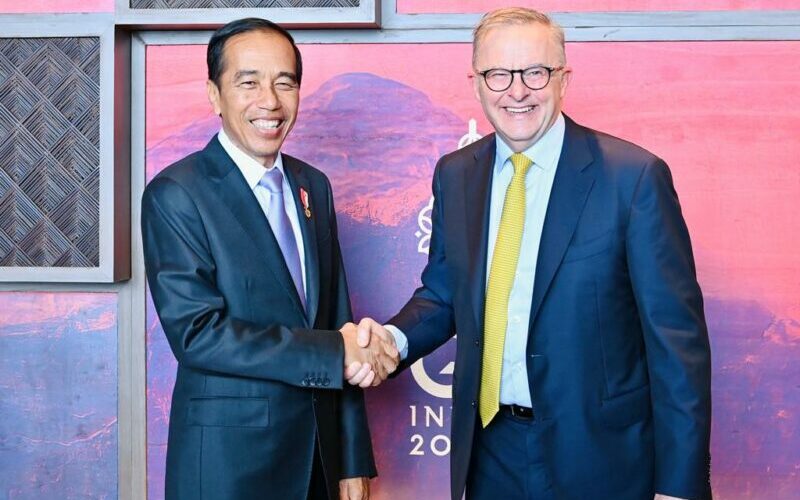Indonesia’s president will leave Australia today after a three-day visit talking up a new economic partnership. But, as Zacharias Szumer writes, the media seems to have missed the backstory.
Indonesia president Joko ‘Jokowi’ Widodo has been getting the red carpet treatment during his visit to these shores as he spruiks a new economic cooperation model based on Australian minerals underpinning his country emerging as an electric vehicle and battery manufacturing powerhouse.
And why not? Indonesia has plenty of copper and nickel, we have plenty of lithium. The Australian media has in turn been spruiking the new deal as a step on the decarbonisation pathway of both nations. Happy days.
But, so far, there’s been little or no coverage of how Indonesia plans to become a battery powerhouse. For a Labor government, currently trying to boost basic wages across many sectors, it makes for inconvenient reading.
How will Jokowi do it?
The Indonesian government has long argued that to realise its electric battery manufacturing dreams, it needs to attract sufficient foreign investment. The president’s trip to Australia was partly designed to achieve this aim.
To attract foreign investment, Indonesia has sought to increase workplace flexibility. In less euphemistic terms, it wants to make the Indonesian labour force sufficiently attractive to foreign investors.
The main way the Indonesian government has sought to do this is through something called the “Job Creation Law”. As Investment Minister Bahlil Lahadalia put it in February of this year “without the Job Creation Law, we can’t build an ecosystem for electric vehicle battery (manufacturing).”
The Jokowi government first passed the Job Creation bill in 2020 as an “omnibus” law that, in a single legislative move, altered 79 laws considered an obstacle to investment.
It made it easier to lay off employees without notice and lowered severance pay. It reduced overtime limits and enabled companies to keep workers on temporary contracts for an indefinite period of time. It also eliminated certain rights to forms of paid leave – Indonesia, for example, has paid menstruation leave.
It relaxed rules around indexing wages to inflation and setting minimum wages in accordance with the cost of living in different regions. One Indonesian labour law expert said this resulted in the “historically lowest annual wage increase ever” in 2022.
Amnesty International Indonesia’s executive director Usman Hamid has said the bill “has the potential to violate human rights and have a regressive effect on Indonesia’s international human rights obligations, namely on the right to work and rights at work.”
Opposition, countermoves and threats
A public survey carried out by Indonesian network Kompas in January of this year indicated that over 60 per cent of the public didn’t support the presidential de-regulation.
Understandably, it’s particularly unpopular with trade unions and progressive groups of university students, who have protested the law in large numbers since its inception. Some of these protests have turned violent:
Widodo has said that the protests were driven my “misinformation” and social media “hoaxes” While these protests have not swayed the government, opponents of the Job Creation Law did have a temporary win when, in 2021, the law was annulled by the Constitutional Court.
However, the Jokowi administration has since manoeuvred around this ruling. They repackaged the legislation as an emergency presidential decree and whisked it through the house in March this year.
The emergency cited by government was the need to respond to the “global economic crisis and global recession” caused by COVID and the Russian invasion Ukraine, in addition to the “repercussions of increased inflation and the threat of stagflation.”
Indonesian legal expert Bivitri Susanti says that passing it in this way “is certainly comfortable for the government, which does not want its policies to be discussed in advance with the people’s representatives or in the public’s eyes”, adding that it seemed like “authoritarianism packaged as a law.”
In recent months, Confederation of Indonesian Trade Unions president Said Iqbal has said that five million union members from hundreds of factories will walk off the job for five days in July or August to protest the law. Time will tell whether this threat is real or simply a bluff.
Iqbal is also president of the Indonesian Workers Party, a long-dormant party that was revived in 2021 by over trade unions to compete in the 2024 elections. They have made opposition to the Job Creation Law their number one priority.
Questions for Albanese and Labor
It’s not likely that the mainstream media is engaged in some kind of conspiracy of silence over this issue. Many journalists are probably simply unaware of it. Or perhaps they consider such domestic Indonesian issues not worthy of inclusion in covering a presidential visit.
More likely, many were so pressed by impending deadlines that they based much of their coverage on government or business group press releases, which tend to avoid issues that might compromise a looming trade deal.
Nonetheless, it seems like there are relevant questions to be asked here. Has Albanese or other representatives of the party ostensibly representing our nation’s labour movement brought this up, even once, with the Indonesian government?
Are members of the Australian Labor Party comfortable facilitating deals with the Indonesian business and political elite, if the latter’s economic vision is built on worsening conditions for Indonesian workers?
Before Australia enters a new partnership with Indonesia, it would be good to know the answers.
Zacharias Szumer is a freelance writer from Melbourne. In addition to Michael West Media, he has written for The Monthly, Overland, Jacobin, The Quietus, The South China Morning Post and other outlets.
He was also responsible for our War Power Reforms series.

